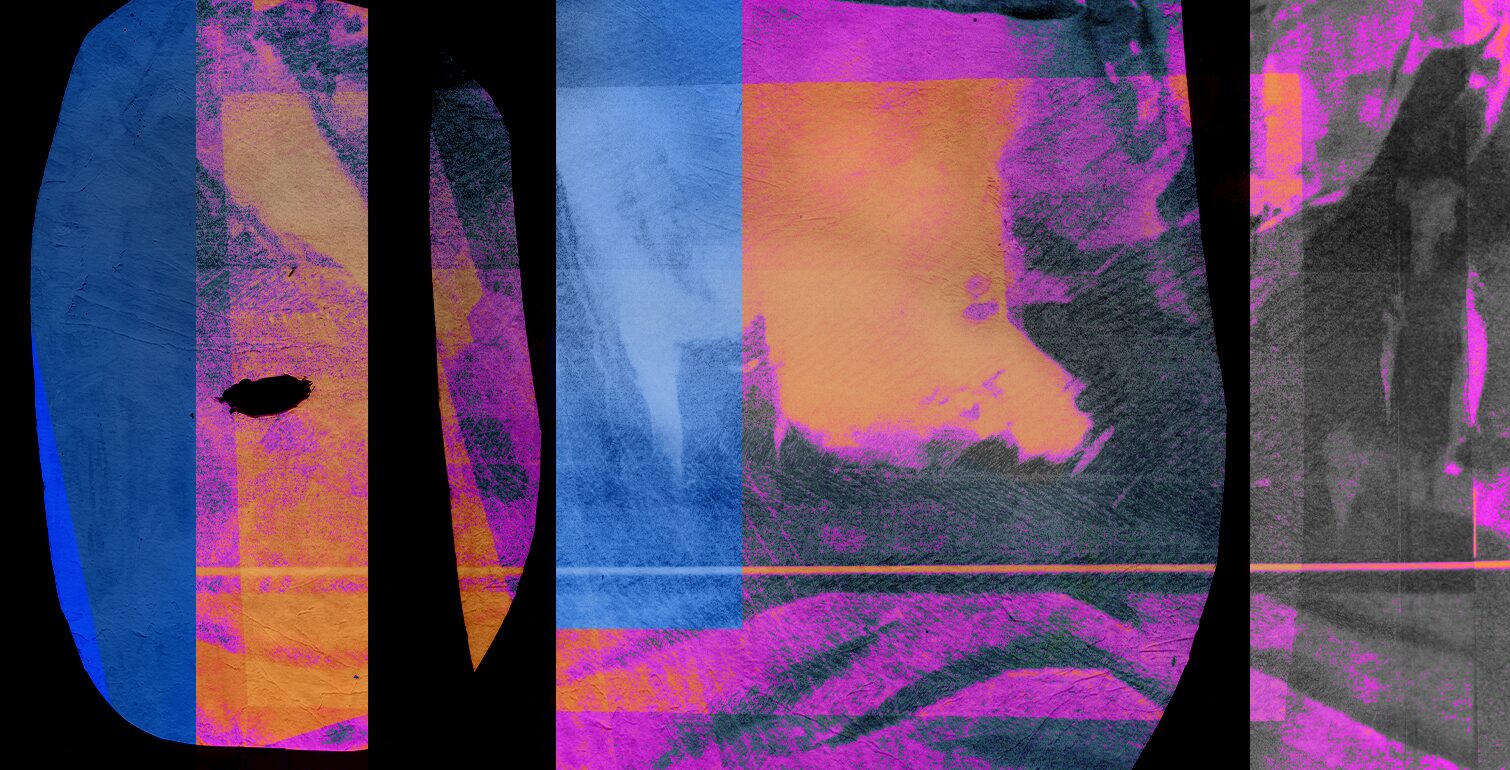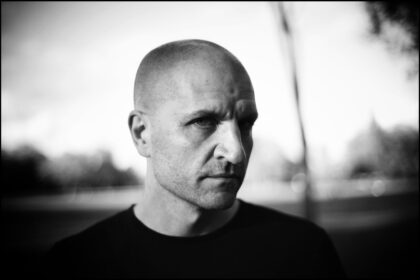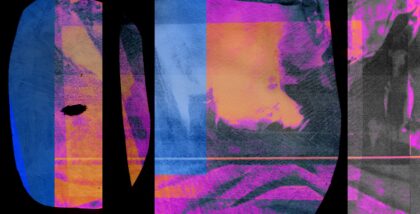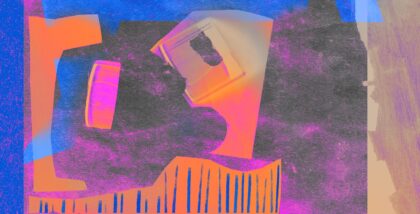 Artwork by Candice Evers
Artwork by Candice Evers
Boom! Shake-a-ray.
Boom-shake-a, boom-shake-a
Boom! Shake-a-ray.
You, there passing by! E kaabo. We welcome you.
Who is this we, you say? Certainly not this empty beaded calabash, too common an instrument to even rest beside us. All that the agbe can recite in her muffled voice is boom, shekere. I beg-o, let the women speak who have a thing to say.
How are you today, my friend? Se alafia ni? And us? We do not complain nor claim bad luck. Neither will we tempt fate by boasting of good fortune. This is a saying among our people. A market woman never says she has sold all her goods. When asked, she will only say “trade is improving.”
After all, this museum shelf is our penance, a place of Purgatory. If we do not forgive those who captured us, we may not be forgiven for those we helped to capture.
O-ho! I see that we have shocked you. Do not be alarmed. No one could even understand until they know our story. You may see us as some ancient relic trapped in a White man’s museum, but we are more than this. Much more.
A great ancestor must not tire her voice in everyday chat. She must have someone to speak on her behalf and I am that linguist. What you see before you is ileke, the waist beads of Madam Tinubu, fetish of her female power. Efunroye Tinubu, I say.
If you do not know her, you must listen, oja re. Come and witness the birth of a story. I have been pregnant with it for over 200 years.
***
I had barely broken my first blood, celebrated my female rites of passage, and donned the waist beads of womanhood when raiders descended upon my village. They destroyed Owu, capturing or killing all they found. I might also have been slain or taken captive, had I not hidden in the bush to watch the fires burning.
I stuffed a fist into my mouth and wept to watch my world crumbling like dried egusi seed. I cried until my eye water was finished, but there were not enough tears to quench the fires. When the raiders escaped with their plunder, I rooted in the ashes to find what was left. I could no more be a child, for I now had to keep myself alive.
I made my way down to the coast and began hawking maize porridge and akara bean cakes to the very oyinbos whose trade had destroyed my village.
I might have had my vengeance then. I could have cooked poison into the food I sold, sending a few White men into the afterworld before I myself was taken. Yet I was friendly to native and oyinbo alike. I learned to feed the trade, and the trade fed me. Soon I was entrusted with hard items to sell, salt and tobacco, livestock, cloth, weapons, and even gold. But I was not satisfied.
I knew what other cargo packed the holds of those merchant ships. They imagined they could keep it from me? Foolish men. Women commanded commerce in Yorubaland.
Quite proper it was that my ileke were made from trade beads, for I became queen of commerce in my time. What was that market? Hm. No doubt you will hiss, click your 21st-century teeth and puff up with indignation.
You must understand that I husbanded several mates, several times over. Do not correct me. I know the meaning of the word. I have mastered the intricacies of this stiff, toneless language that has become my second tongue. Long before I grayed into a menopausal elder to become an honorary man, I was yet a husband.
To husband means “to preserve, protect, safeguard, or store.” I had become Queen Mother of the Market — Iyalode of all Egbaland. No man ever protected Madam Tinubu. Palm oil was my husband. My tobacco and weapons, my foodstuffs and fabrics, my trade goods took care of me. Yes, too, my slaves. And why not? Our people have always been master traders. Europeans came with their whiskey, guns, and Bibles, to barter for human beings. There was a need to be met, a profit to be made. And of those who came to my compound demanding “where is my son?” The ones in okeokun across the seas, roaring, “where is my mother?” Those shark-gnawed bones at the ocean’s bottom moaning, “mother, where am I?” Should the laws of the market bow to such qualms? Must the deeds of history be judged by the biases of the present?
I learned well my lessons in Aye and Orun, in this world and the next. If you bring nothing to the market, it brings nothing to you. It is a market woman’s duty to find a demand and meet it, not with a paltry store but with a great abundance. And with hard work comes great wealth.
I was not the only native plying this trade in the British Protectorate of Southern Nigeria. It is no boast to say that I was among the best.
Rivals carved their faces in our tribal markings, thinking to deceive us that they were our people. We knew which ones to fight, my friend. We knew. If we didn’t come to capture them, they would have come to capture us.
I followed the wars, bartered for the survivors, marched them to the coast, and sold them to the European factors for more than I had paid. I soon came to control the entire slave trade along the coast from Badagry to Benin.
What else was I to do? Become a slave myself? Hire myself out as a maidservant to a White woman who would squeeze herself into a whalebone corset? Me, Efunroye Tinubu? Not the way I saw how they derided the black hands who served them their tea and crumpets. How they idled away their days muttering about the she-heathen doing business with their husbands. Drawing rooms were no place for me. The marketplace held the power.
European men courted favor to my face, hissing “whore” behind my back. To them, it was the only kind of woman to move in the company of men. I sold many goods in my lifetime, but never my own body. Ah-ah! For that insult I would make them eat pepper.
Those same men would come to call me Madam, a kingmaker and king-breaker. Did I truly help dethrone the old Oba of Lagos? It was work that had to be done. This man threatened to end the slave trade, to collapse the market by which so many fed. How foolish to suggest such a thing.
Imagine wiping out the petrol trade this your world rests upon! Think of all the wealth that would vanish, all the people who would go hungry. Your way of life would crumble into ashes just as mine did back in Owu.
That Oba was even a tool of the British, for they are the ones he went crying to when he was driven out. In time the Whites restored his throne and ordered me expelled from Lagos. No trouble to me. An Iyalode may ply her goods in any market.
I went north to Abeokuta and opened a market stall. I married my first husband and bore my children, none of whom survived. In time I collected homes, possessions, and many responsibilities. My compound was its own small village.
Oh, the throngs that flocked to my door, begging for my patronage! We all knew of the slave market across the water. Some had been there and returned to tell the story. When your goods come back to you, should they be cast aside? No, they must be embraced. Some of the returnees would even join me in the trade.
When the British traded slaves they prospered for centuries. When we began mastering this market, they snatched it all away. Fat and flush with wealth, they would now preach against the very trade they helped create.
It takes more than a fly whisk to crush a scorpion. I learned to bend to these new winds. I took up other goods to sell. Oyinbos became wild for palm, an oil to grease the machinery of their industry. I planted palm trees on my properties, buying even more with the profits I earned. I had already matched the Whites in trading slaves. Now I came to rival them in palm oil.
I became as big an abolitionist as the British themselves, bestowing money on the returnees, establishing benevolent societies for their support. It was not from guilt, my friend. At-all! It was my way to lift my lappa and present to them my buttocks, those who said commerce was only meant for men. That women must sit home with their corsets and crumpets.
Here is the secret I learned as a young girl fleeing a burning village. You must join them but do not become them. I have always been a woman of Owu, even in their churches and cathedrals.
When the White men take you into their shrines, they reveal to you their mysteries in order to seduce you away from your own. I allowed missionaries to teach me reading and writing. I needed this to conduct my trade. Yet I never forgot my own tongue. They could never convert me to their gods.
Yes, I have married four times over. Perhaps you heard the rumor I would rid myself of husbands by selling the excess into slavery. If I did so, it was only out of need.
Our people have always believed procreation as the highest order of human endeavor. An ancestor with descendants will live on forever. Those without them die the death of the disremembered.
I had been trying for years to trick obanji, the spirit that loves birth but does not love life. I wanted a child to replace those I lost as a young bride in Abeokuta. I went to Osogbo to beg the goddess of fertility, but Osun never granted my prayers. I cared for my men in fine style, feeding and clothing, husbanding them all. The least they could offer was a child. None of them would give me.
I could not bring myself to go about buying up wives like other prosperous market women, sending them out to mate and taking ownership of the children. Me, I wanted my own. Yet even a wealthy woman could not behave like a man, marrying many all at once. In order to get another husband, I needed to shed the last.
I never murdered any one of them, cutting his throat while he slept. I would only send one into okeokun so another could take his place. Who knows that those I sold did not find their own wives away in the overseas? Those same men’s descendants may be out in the world today. You could be one of them, my friend.
If you ever struggled to bring forth a child that would not come, you understand my pain. If you have not, try not to judge me harshly. Our time is not your time, after all. Our beliefs are no longer your own.
No descendant carries my blood into the future, but I have not died the death of a disremembered ancestor. A shrine in my name was dedicated at Abeokuta. I now have gotten revenge on the Oba of Lagos, my old enemy. Tinubu Square stands in the heart of his city, leafy with almond trees and a sparkling fountain.
I have even been inscribed into history by one powerful oyinbo. My old friend, Father Broghero of the Catholic Mission wrote about me in the French I never learned to read. Yet his pages lived on after I had gone to Orun, and he to his White man’s Heaven in the sky.
Others would come to study Broghero’s words. Plays and songs and stories would be written about Efunroye Tinubu. You do not believe? The missionary’s words are waiting in some dusty room. If you know French, go and read them for yourself.
***
I remained with Madam Tinubu until her death. I was even buried with her but graverobbers came one time and snatched the beads from her bones. I carried her voice away with me when they took me down to Lagos, sold me in Jankara Market, and stole me across the ocean into the heart of their empire.
But this language of yours, na wa-o! Such a puzzle it is. This one word you use, cleave. It means becoming one with another, as in the marriage vows—cleaving only to her so long as you both shall live. Madam Tinubu and I were joined together this way.
Yet to cleave is also a severing, to split along the grain. I was never a living thing, and she is no longer of this earth. We are now as separate as the time before we first cleaved. The ileke of Efunroye Tinubu is now free to speak its own mind.
We said you must join them but not become them, yet we ran from a burning village to loot the burning homes of others. We claimed not to worship the White man’s God, yet what was profit but a gluttonous deity at whose altar we bowed?
We do not beg for mercy in exchange for this confession. The powerful do not need to ask for alms from the overpowered. But if we cannot heal the wounds we have made, perhaps we may atone.
Those of you there in the great okeokun, whether descended from the ones I once sold, or those who purchased my wares—now that you know our uncomfortable truths, can you not find for us a small grain of understanding?
If not, then we must accept your reprisal. Orò is a god of vengeance, after all. As our people used to say, better to let God avenge while you stand aside. If his bullroarers are here to condemn us, so be it. Tinubu has already suffered the greatest disgrace, dying without blood to carry her memory. My punishment has come to be languishing away here for several lifetimes.
The European hoards his looted treasure to be gazed upon. We are mementos of bygone glory, a time when they anointed themselves “Kings of all They Surveyed.”
A family passed the other day. They stopped to peer in on us like animals in cages or captives in the holds of slave ships.
“Dad, what are these things?” the little boy asked.
“Those are the monsters people brought back from Africa.”
A charm has no meaning without the spark that stirs us. The incantation, divination. The drumbeat and the dance. Our magic has dimmed, although some pulse must still linger within us or you would not have stayed here listening.
Though we are not silenced, we have been stilled. It is a painful, though perhaps fitting, retribution, considering what calamities we have sent into this world.
Meanwhile, I preside over this village of antiquities. Who knows what stories the others could tell? The chanting beaded agbe. The wasp-waisted talking drum. Terracotta and cast metal heads from Ife. Ivory and wood carvings from Owo. Beaded silk hangings and silver-covered palace doors from Oyo. These are now our people. This is now our village.
Let the fertility dolls do their juju. Let the agbe chant a rhythm. We are rusted, cracked and worn, it is true. Every one of us has danced a masquerade. Everyone will dance again.
Boom! Shekere.





















